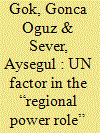| Srl | Item |
| 1 |
ID:
143805


|
|
|
|
|
| Summary/Abstract |
The essay explores why some socio-economic reforms are successful and others are not and why and how the political regime and its institutions affect policy outcomes and the implementation of a ‘narrow’ programme of authoritarian modernisation, characterised by the achievement of socio-economic growth without full-scale democratisation. It reconsiders the Russian experience of policy reforms in the 2000s as a case of authoritarian modernisation in the context of post-Communist policy changes where less than half of the proposals have been implemented, and only a few have been successful. The essay attempts to explain the factors and mechanisms of the successes and failures of policy reforms, focusing on the one hand, on the impact of electoral authoritarianism and the poor quality of the state on opportunities and constraints for policy changes, and, on the other hand, on the institutional factors which affect the vertical and horizontal fragmentation of the Russian government and the efficiency or inefficiency of its policies.
|
|
|
|
|
|
|
|
|
|
|
|
|
|
|
|
| 2 |
ID:
151323


|
|
|
|
|
| Summary/Abstract |
This article aims to explore the relationship between regional powers and the United Nations (UN) with respect to regional issues by examining UN-Turkish ties concerning the Middle East during the 2000s. Bidding for a leading regional role in the Middle East, especially in the 2000s, the Justice and Development Party (AKP) government in Turkey has increasingly used international platforms, including the UN, to gain a significant regional position in the Middle East. Turkey’s relationship with the UN in this respect could provide a relevant example to explore multilateralism and multilateral instruments in Turkey’s perceived regional power role during the last decade. The term “regional power” will be used as a conceptual framework to explore Turkey’s behavioural pattern with respect to the UN in view of the regional-global linkage, as global activism is nearly a standard behaviour of any state with a leading regional power role/claim. In view of this, the period during which Turkey held a temporary seat on the UN Security Council between 2009 and 2010 will be given particular attention in order to identify any significant link or at least any tentative correlations between Turkey’s then-closer involvement in the UN and its regional power role/claim in the Middle East. Moreover, fluctuations recorded in Turkey’s relations with the UN with respect to the Middle East during the last decade will be taken into account to examine a variety of challenges involved in any regional state’s relations with the UN regarding regional issues. Conducting a periodical analysis of Turkey-UN relations with respect to the Middle East could provide some provisional answers regarding both limitations and opportunities related to the future state of relations between any regional power and the most universal organization of world politics.
|
|
|
|
|
|
|
|
|
|
|
|
|
|
|
|